Pages 20-30 From Winter
2010 Florida Golf Magazine ©Copyright 2010, All Rights
Reserved.
To advertise in Florida Golf Magazine in print and on-line, phone
863-227-2751 and/or email joestine@floridagolfmagazine.com
Subscribe at floridagolfmagazine.com/subscribe
|
|
EAST CENTRAL FLORIDA |
KISSIMMEE
/ OSCEOLA COUNTY |
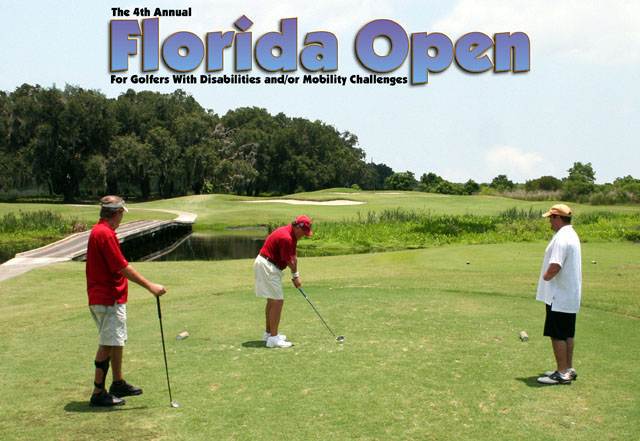 |
|
The 2009 Florida Open
Golf Tournament for Golfers with Disabilities and/or Mobility
Challenges |
|
by Joe Stine
Golf
has long been known for its ability to heal, the mind, body and
spirit. Nowhere is this made more apparent than at the Florida
Open Golf Tournament for Golfers with Disabilities and/or Mobility
Challenges.
The 2009 open
tournament was very much an inspiring success and a lot of fun
for everyone involved. The annual open tournament took place
on June 14th, 2009, and for the fourth year in a row was hosted
by the generous folks at Kissimmee Bay Country Club.
A diverse group
of golfers showed up and participated, rallying to raise awareness
for the accessibility issues concerning golfers with disabilities
and/or mobility challenges, but more importantly they came to
have fun while playing golf. Participants of the 4th annual tournament
included golfers of all levels of abilities as well as disabilities.
As in previous
years, several members of the prestigious Eastern Amputee Golf
Association competed in the 2009 open tournament, some of whom
wore prosthetics and some who didn’t. But make no mistake;
this all inclusive tournament was not just for amputees. There
was also an eclectic collection golfers participating that were
mobility challenged from the effects of such conditions as strokes
and paraplegia.
In a conscious
effort to be all-inclusive, golfers without disabilities were
encouraged to play in the open tournament, along with their friends
with disabilities, and were eligible to compete for the Overall
and Low Gross Awards. Everyone with a USGA Handicap was also
eligible to compete for the Low Net Awards. As always the player
with the lowest gross got the honor of having their name inscribed
on the permanent open tournament trophy.
Sponsored by
Florida Golf Magazine with some initial ‘much needed’
guidance provided by the National Alliance for Accessible Golf,
the goal of the open tournament is to “have fun playing
golf, while raising awareness of accessibility issues concerning
golfers with disabilities and/or mobility challenges.”
The National
Alliance for Accessible Golf (accessgolf.org) is an organization
focused on the inclusion of people with disabilities into the
game of golf. The Alliance is administered by a Board of Directors
representing the major golf industry organizations in the United
States. These organizations provide services for people with
disabilities, and individuals and others who advocate for the
inclusion of people with disabilities into society.
Kissimmee Bay
Country Club should be commended for being at the forefront of
this type of event. Kissimmee Bay Country Club‘s owner,
Bill Stine, who is a former president of the Florida Golf Course
Owners Association told us that Accessibility for mobility challenged
golfers is considered ‘business as usual’ at Kissimmee
Bay.
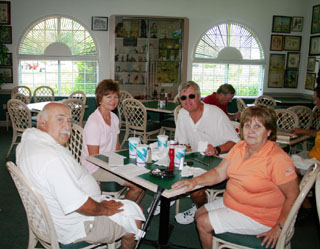
(Sitting on left) Port
Orange resident and stroke survivor, Jim Sylvester was sponsored
in the open tournament by The Golf Club at Cypress Head.
The Golf Club at Cypress
Head sponsored a golfer in the 2009 open tournament.
The
Golf Club at Cypress Head, an Arthur Hills designed municipal
course in Port Orange, Florida, should also be commended for
their part in sponsoring a golfer in the 2009 Florida Open Tournament
for Golfers with Disabilities.
When asked about
the company check that was used to pay the tournament’s
fifty-dollar entry fee, Jim Sylvester, (pictured above sitting
with his wife and friends) a stroke victim and an avid golfer
from Port Orange said “The folks that run the Golf Club
at Cypress Head are very conscientious of mobility issues concerning
seniors and golfers with disabilities. This was the fourth year
in a row that they have sponsored a player in the open tournament.
The Golf Club
at Cypress Head deserves special recognition for sponsoring a
player in each of the four annual events.
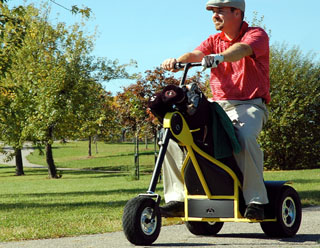
‘Bridgeburg Golf,
makers of ‘The Turf Chopper’ single rider golf cart,
helped to raise awareness by sposoring the 2009 Florida Open
for Golfers with Disabilities.
|
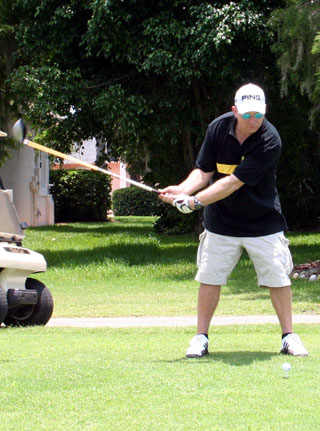
Charles Brugh, aka “Brew”
competed in the 2009 Florida Open Golf Tournament for Golfers
with Disabilities and/or Mobility Challenges and very much inspired
everyone he met, especially the tournament champion, Ian Halliwell.
Written in late 2007 as
part of a successful grant request from the Challenged Athletes
Foundation:
I,
Charles Manning Brugh, am a survivor of a near-fatal automobile
accident that left me with severe “permanent” brain
damage. As a Traumatic Brain Injury survivor (comatose 2 weeks),
I‘ve been forced to rebuild my entire persona – mind,
body, and soul. Of my own volition, by promoting and enhancing
neurogenesis and neuroplasticity, I have determined how to affect
the wholesale remapping and restructuring of my intricate neural
network. I use diverse adaptive athletics and copious independent
study to effect phenomenal neurologic regeneration. Essential
to sustained rehabilitative success is physical, psychological,
and cognitive fitness. Inherent multiple challenges of adaptive
sport promote health and fitness in these critical attributes
concurrently. Traumatic Brain Injury (TBI) continues to challenge
in ways I never knew possible. I spend an inordinate amount of
time, effort, blood, sweat, tears, pain, and money rehabilitating
my cognitive, physical, and spiritual health. Am I "all
better"? Far from it. However, I continually improve –
with limitless potential.
Adaptive sport
is phenomenal therapy. Substantially enhancing quality of life,
the athletic challenges of adaptive sport are central to my determined
efforts to prevail over near-fatal Traumatic Brain Injury (TBI).
Extensive and diverse, my expansive personal experience with
adaptive sport and purposeful outdoor endeavors span nearly two
decades. Since my motor vehicle accident of 21 March 1990, my
athletic/therapeutic repertoire includes:
Adaptive Golf – Adaptive Water Skiing/Knee boarding –
Sailing; in 2004 I lived on a 100ft, hand-built, 3-masted, wooden
tall-ship for 5 months anchored in the ports of Jonesport, Rockland,
and (briefly) Cutler, Maine – Climbing walls (indoor &
outdoor) – Multi-day bicycling tours – Sea-kayaking
trips – White water rafting trips (multi-day) – Canoeing
trips (multi-day) – Camping (throughout central and north
Florida, Michigan, and the Colorado Rockies) – Horseback
Riding – Adaptive Surfing – High & Low Ropes Courses
– Fishing (fresh water and salt water) – Off-road Mountain
Biking – Rock Climbing – Parasailing – Adaptive
Alpine Skiing – Wheelchair Rugby (Brooks Bandits/United
States Quad Rugby Association – Atlantic South Division)
- Wheelchair Tennis (First Coast Tennis Foundation/Brooks Wheelchair
Tennis League) – Competitive Handcycling – Adaptive
Rowing (Jacksonville University/Brooks Adaptive Sport and Recreation
Program)
Neurophysical
skill needed to compete in adaptive sport is extensive, and,
at times, overwhelming – particularly for a Traumatic Brain
Injury survivor such as myself; timing, eye-hand coordination,
balance, information processing, fine and gross-motor skills,
communication, visual-spatial relations, attention, judgment,
memory, perception, and reaction-time are all required cognitive
abilities. With enough purposeful effort, repetition, and focused
attention, cognitive and neuromuscular skills are reacquired
and enhanced. I am rarely satisfied – constantly I raise
the bar. I fondly refer to this as my ‘achievement addiction’.
While I never subject others to the same level of scrutiny, in
any endeavour I hold myself to the highest of standards. I am
my own worst critic. I am my own best critic.
I possess an
aggressive spirit. I am also highly competitive. For the first
17 years, multiple physical and cognitive deficits necessitated
competition primarily against myself in unrelenting efforts to
rewire and reconstruct my being. For nearly two decades, I have
used adaptive sport to promote and enhance neuroplasticity and
neurogenesis in my traumatically injured brain. I have progressed
to a point my rehabilitative focus again includes competition
against other athletes. Competition brings out the best in me.
Training, rehabilitation, and competition are complementary endeavors.
For this reason, athletic training, practice, and competition
are central to my continued rehabilitation. I now practice and
compete with others challenged by disability – fantastic!
Coupling self-directed neuroplasticity with the diverse cognitive
and physical challenges of adaptive sport, I am overcoming severe,
“permanent” brain damage to a degree few thought possible.
I make remarkable progress applying my God-given intelligence,
talents, and tenacious determination, to many adaptive sports.
The life we lead creates the brain we have.
Charles M. Brugh |
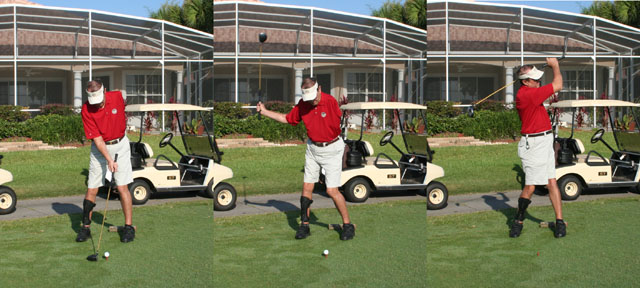
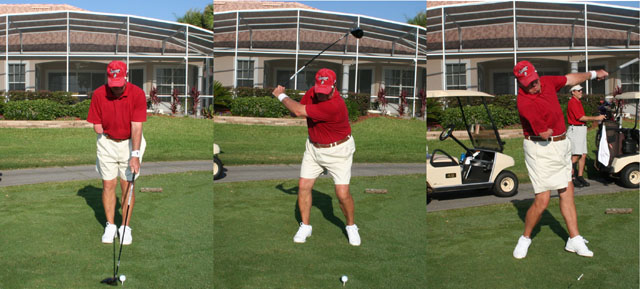
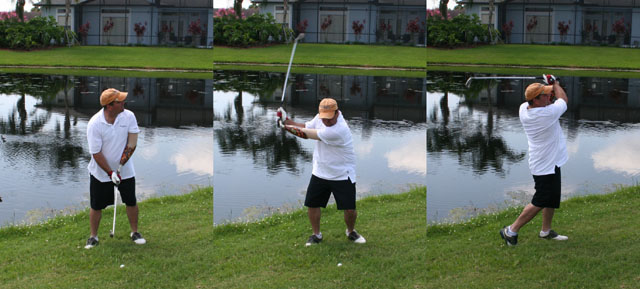
“Addressing the needs of golfers with disabilities is more
than just the right thing to do, it's good business.”
Making
an investment in golfers with disabilities is a hot new trend
in the business world. According to the 2002 census bureau report,
one in five U.S. residents has a disability. That’s about
18% of the U.S. population or 51.2 million people. More and more
people, such as inventors, designers and golf course owners,
are making an effort to address the needs of golfers with disabilities.
This tournament lets everyone have a lot of fun while raising
awareness of those issues.
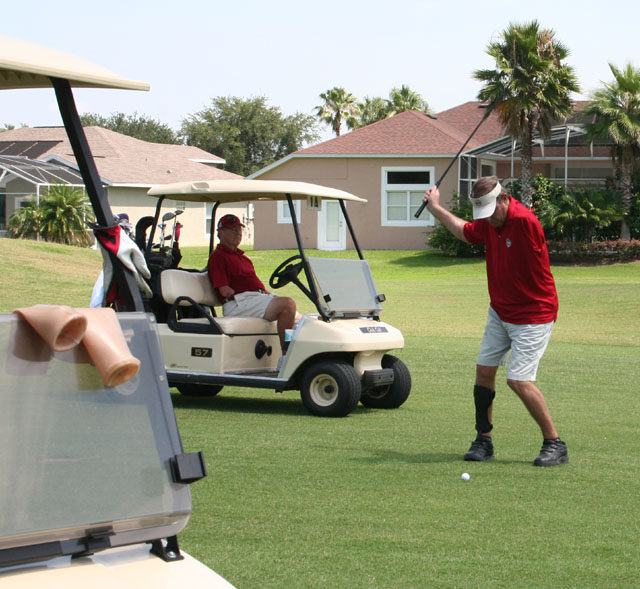
One innovative
company that has helped to raise awareness of the issues concerning
golfers that are mobility challenged, by sponsoring the 2009
all inclusive open tournament is Bridgeburg Golf. (www.bridgeburggolf.com)
The compassionate
folks at Bridgeburg Golf are the makers of the ‘Turf Chopper’;
a new three wheeled single rider electric golf cart that weighs
only 150 lbs. This new addition to the golf cart arena is compact,
quiet, affordable and easy to operate. (See the full-page ad
on the back cover.) Not by coincidence the name was chosen because
its unique design resembles a three-wheel motorcycle “chopper”.
But that’s where the comparison ends.
Billed as “a
next generation golf cart,” the Turf Chopper has revolutionized
the single-rider concept that is beginning to reshape the industry,
and priced at less than $2000, it offers a cart that’s price-point
is far below many current options available.
Weighing in at
a mere 150 pounds without rider and clubs, the cart exerts less
weight per square inch than conventional and other single rider
carts and leaves no discernible footprint. This is a definite
plus for greens-keepers and course maintenance.
Many Florida
golf courses, like Kissimmee Bay Country Club, will now allow
golfers with disabilities to ride these types of lightweight
single rider carts onto the putting greens. For many mobility
challenged golfers it is the only way they can get out and play
golf.
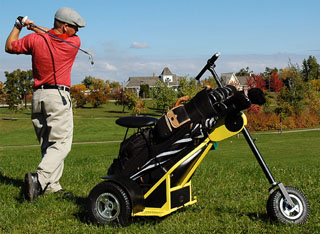 The
tournament director and the GM of Bridgeburg Golf, both rode
Turf Chopper single rider golf carts in the 2009 open tournament
and they performed flawlessly. The
tournament director and the GM of Bridgeburg Golf, both rode
Turf Chopper single rider golf carts in the 2009 open tournament
and they performed flawlessly.
Born out of necessity,
the Turf Chopper’s inventor experienced debilitating back
pain while playing his favorite game. He loved golf but said
walking 18 holes was out of the question and riding in a conventional
cart only made matters worse. Being determined and resourceful,
he set out to build a cart that would adapt to his needs; after
several attempts the prototype for the first Turf Chopper came
to fruition.
In 2010 Bridgeburg
Golf will once again be a sponsor of the Florida Open For Golfers
With Disabilities and/or Mobility Challenges. They have commited
to bring a dozen Turf Chopper’ single rider golf carts for
players to use during the tournament. The 5th annual open tournament
will be played at PGA Village on August 28, 2010 at the prestigious
PGA Club in Port St. Lucie, Florida.
|
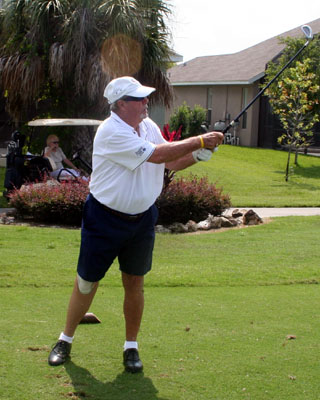
Virgil Price, a St Petersburg
resident and Treasurer of the National Amputee Golf Association
(NAGA), dominated the inaugural tournament in 2006, winning 1st
Place overall, scoring a gross 72 on the challenging 18 holes
at Kissimmee Bay. |

Mike Hudson shot a 75 to win
1st place Overall in the 3rd Annual Florida Open Tournament for
Golfers with Disabilities and/or Mobility Challenges held on
7/14/08. Born with only one hand, Mike Hudson is a Volunteer
Golf Instructor in Pasco County. |
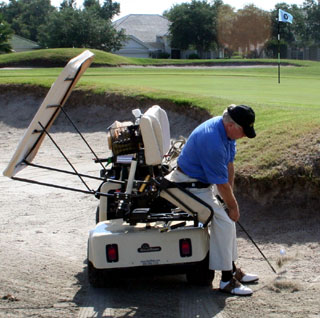
Tampa resident, Monroe Berkman,
a polio surviver, won the 2007 Florida Open Tournament for Golfers
with Disabilties, playing every shot, including sandtraps from
his SoloRider Adaptive Golfcar. Berkman, who shot 80 had no problems
hitting out of the bunkers using his stand-up seat to support
him during his full golf swing. |

Stroke survivor, Ian Halliwel
came all the way from England and shot a 74 to win 1st Place
Low Gross in the 2009 Florida Open Tournament for Golfers with
Disabilties and/ or Mobility Challenges. Now his name is also
permenantly inscribed on the prestigous Open tournament trophy. |
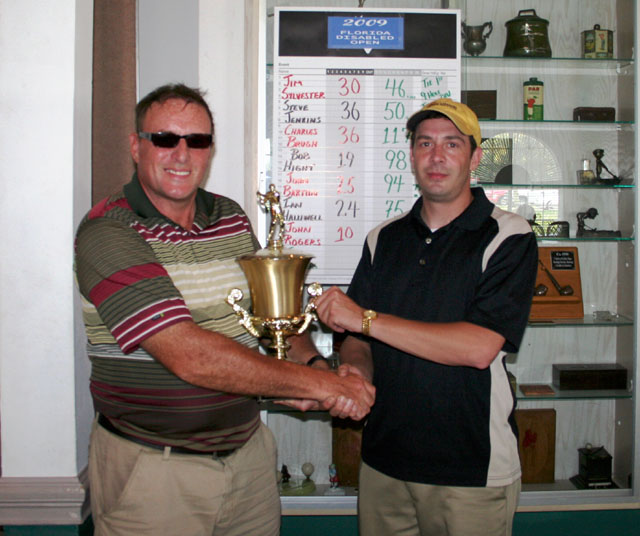
Bridgeburg Golf GM, Mike Mazza
presented the open tournament trophy to the 2009 1st Place Winner,
Ian Halliwell.
For
some of the participants the annual golf tournament is a chance
to look within and hopefully widen the scope of their abilities.
For others it’s more of an opportunity to look outside of
their own selves and learn by focusing on the issues concerning
their fellow golfers. Stroke survivor, and this year’s 1st
place winner, Ian Halliwell did a little of both.
Ian Halliwell
who had initially lost the use of the left side of his body,
due to a stroke, said that he was most positively influenced
and encouraged to win by his playing partner in the tournament
who was a Traumatic Brain Injury survivor. “I am humbled
in his presence,” said Halliwell of his playing partner,
Charles Brugh. “I hope we remain good friends, in good health,
and that I can be a little part of his continued remarkable story.
Meeting people
like Charles (aka Brew) makes my campaign to raise stroke awareness
all the more worthwhile. I hope that he his able to join up with
me when I hit Florida on my Round the World Trip next year.”
Halliwell who
had come all the way from the U.K. to play in the tournament,
shot the ‘Low Gross’ score of 74 to win 1st Place in
the all inclusive, 2009 open tournament. Now his name is permanently
inscribed on the prestigious open tournament trophy along with
the three previous winners.
Ian Halliwell,
has dedicated a large portion of his life to raising stroke awareness
by telling others how his recovery was facilitated by golf. Ian
also has spent a great deal of his time tirelessly fund-raising
around the world for The Stroke Association. (www.stroke.org.uk)
by organizing celebrity tournaments and by publishing a book
entitled ‘The Social Golfer’.
The Social Golfer
started as a travel and golfing journal published to raise funds
for The Stroke Association and grew to include the Social Golfer
web-site and blog (thesocialgolfer.blogspot.com) where you can
follow Ian's tireless fund-raising golf trips around the world.
The
Social Golfer, by Ian Halliwell
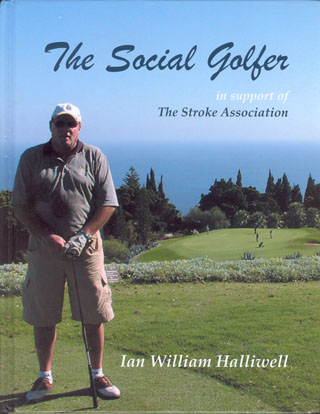
Prior to his
stroke in December 2006, at age 48, Ian was an avid golfer and
had enjoyed many golfing trips to the Costas, Tenerife, Tunisia,
and South Africa. Playing to a handicap of eight, he still harbored
dreams of retiring and trying for his card on the Seniors Tour,
but those dreams were dashed just days before Christmas of 2006
when he suffered a major stroke which caused total disability
to the left side of his body, leaving him unable to speak or
move.
“I still
have aches and pains,” says Halliwell in his book. “My
left side is still slow in relation to the rest of my body. My
leg causes grief periodically. When asked by the doctor how I
feel, I usually reply, ‘Uncomfortable, not ill,’ to
which he often replies, ‘We cannot do anything about discomfort,
it comes with the territory.’
Later in his
book Halliwell, who went from an 8 handicap before his stroke
to a 17 handicap after his stroke said, “With golf, my swing
is now much more secure without the rotating hips of my left
side.” He also states, “Golf is such a big part of
my life and has been the catalyst for much of my recovery.”
In regard to
the stress of taking golf too seriously, Ian now says, “Since
my stroke, my golf game has not worsened at all. Indeed, because
of my medication, I presume, I no longer fret over four footers.
I simply hit and if it goes in, that’s great, if not, so
what. My score is irrelevant. I now play the way the elders intended
golf to be played. You start at A and end up at B and play wherever
it rests in the meantime, with no drops, and no preferred lies.
Seven is not a dirty number, taking seven is better than not
playing at all.
I love playing
and being in the company of good players - you cannot fail to
admire their skill and technique. Mulligans,” he goes on
to say, “are a thing of the past. Every shot is important;
you never know, it could be your last so enjoy it.”
Halliwell’s
book details his amazing and inspirational recovery and return
to the golf course after just over a year. The book also details
how he is heeding Pro Golfer, Bernard Hunt’s sage advice
to “become the best damn social golfer on the planet”.
"I know
that there are many people out there who feel beaten by a stroke,”
says Halliwell in his book. “Progress can be so slow and
frustrating that it often seems easier to just give up. Golf
helped me focus on my recovery and I’m hoping that my journal
will help others find their own motivator."
So far ‘The
Social Golfer’ has raised over £20,000 for The Stroke
Association, and has just been added to Amazon and WHSmith’s
on-line stock and all profits are being donated directly to The
Stroke Association.
Around
The World in 80 Days: 2010 a Golf Odyssey
As an experienced
charity author, Ian will be following in the footsteps of the
Jules Verne character Phileas Fogg in 2010 with an exciting announcement
of his next major fund-raising event. Around The World in 80
Days: 2010 a Golf Odyssey is the latest plan by the golf enthusiast
to raise money for charity.
Ian, who has
already raised over £20,000 for The Stroke Association,
plans to travel the world from January 2010 to March 2010 playing
golf at some of the most illustrious golf courses in an attempt
to continue raising much-needed funds for both The Stroke Association
and The Multiple Sclerosis Society.
“Both The
Stroke Association and The Multiple Sclerosis Society have been
extremely helpful to myself and my family,” stated Ian.
“We received invaluable support from The Stroke Association
following my stroke in December 2006, and want to help raise
funds for The Multiple Sclerosis Society in recognition of my
wife Karen’s illness.”
Ian’s literary
skills will again be in use as he intends to write a follow up
to his recently published book, The Social Golfer, which will
be documenting the trip but also rating the different golf courses
he plays.
“I will
be fortunate enough to play at courses such as the Ko lau Golf
Club in Haiwai and the legendary Pebble Beach and Cypress Point
Golf course as well as competing in The Wrest Point Masters in
Tasmania and The Edwin Watts Tour in Florida,” said Ian.
“And I would like to share my experiences with other people
as well as following the Social Golfer format by rating each
course, and of course, all proceeds raised will be donated to
charity.”
Excerpts
from ‘The Social Golfer’ Blog www.thesocialgolfer.blogspot.com
The Social Golfer
is a travel and golf journal, web-site, and blog written by avid
golfer and stroke survivor, Ian Halliwell, about his recovery
and tireless fund-raising around the world for The Stroke Association.
(www.stroke.org.uk)
Written Tuesday,
23 June 2009
THE 2009 FLORIDA OPEN FOR GOLFERS WITH DISABILITIES AND/OR MOBILITY
CHALLENGES
Last year I was
most fortunate to play in the 2008 event at the magnificent Kissimmee
Bay Country Club. This event features golfers from all over the
USA with a variety of handicaps that have amazingly not stopped
them participating in – and more importantly – enjoying
golf. They epitomize all I try to ensure the Social Golfer promotes:
total enjoyment and social interaction through golf.
I was fortunate
to be in a foursome with two winners: Mike Hudson, a low handicapper
with just one arm, and Renee Russo a sprightly golfer with a
prosthetic leg following an amputation when she was a young lady
in her 20s. I met many golfers with significant physical handicaps;
double amputees mixed with fellow stroke victims and heart attack
patients. The event encompasses all that is good about golf and
is the perfect remedy when I occasionally still feel sorry for
myself.
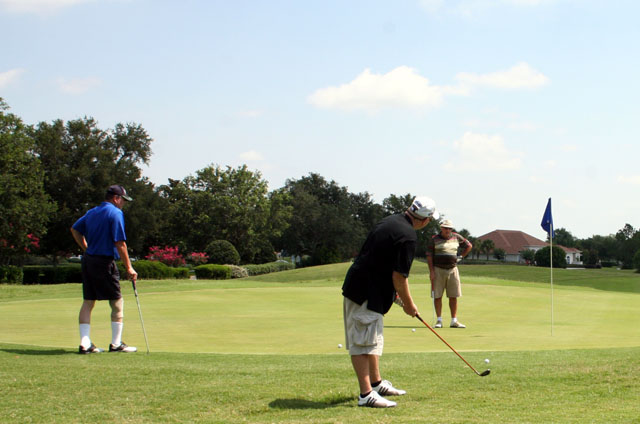
Getting
encouragement on the way around
So, it was with
great pleasure and anticipation that I returned on Saturday for
this year’s competition. Last year the event had over 40
participants, sadly this years was less well supported, partly
I think because of the oppressive heat wave we are currently
enjoying. I guess even for these most-keen of golfers, 18-holes
in 100 degree temperatures and intense humidity is not pleasurable.
Still, the course was in pristine condition and all set for a
magnificent day’s golf. I was in a threesome with Tom, a
retired American History teacher from The Villages, in North
Florida. Naturally I asked him what history! Tom had sadly lost
his leg over 40 years earlier in a freak accident (in the 8th
grade) playing gridiron. A lifetime without a limb. Still it
ensured I did not moan about my stiff left leg.
The true spirit
of golf and how to overcome difficulties
Tom was very
keen and competitive and an enjoyable companion during the round:
he pushed me to deliver all the way. Our third member was a young
man called Brew, who had been involved in an automobile accident
19 years-ago. He was still being treated and had obviously been
in quite a bad way and had only recently taken up golf to supplement
his ongoing recovery. He played the entire round and each shot
with an enthusiasm I found spiritually fulfilling, I became his
unofficial caddy, reading putts, recommending clubs and generally
encouraging this remarkable young man.
It has been said
life and a round of golf can be compared to an amusement park:
each hole and each day are different but there to be enjoyed.
Brew clearly had more than his share of ups and downs, and difficult
times, but I have rarely completed a round feeling quite as content
as I did this one and that was before the score. Brew now knows
many English golfing terms including: hit it hard... find it...
hit it hard again… whack it... cracker… give it a welly...
Because I was
so relaxed and the course set up particularly lenient in view
of the difficulties some players would have (and bear in mind
all the events I had played were off championship tees) suddenly
playing off the front tees made the course so much easier. I
shot 40 out and with the aid of two chip-ins on the back nine
level par 35 for 75, to finish the winner by 6 shots. The main
source of my success was the support given by both my partners
and organizer Joe Stine who all constantly encouraged me during
the round as they realized I was in contention.
I gave a gift
of my book to all competitors and had a book signing after the
cup presentation. The book was well received by all. Whilst unbelievably
proud to become the 4th winner and first overseas champion, I
will take from this day far more than a golf success. My sincerest
hope is that on that day I encouraged Brew to continue his golf
journey. I hope to keep in touch and anticipate the pleasure
he will have if and when he breaks 100.
“Brew”
(Charles Brugh)
Finally, I leave
this trip with the story of the guy who inspired me most. I thought
I had it difficult till I read this, and I offer it as encouragement
to all individuals who suffer illness and disability, and to
all of us who are feeling down because of the economic climate
as a reality check as to what is important. From Brew:
“I'm
unclear what I’ve told you previously about me and my injuries
(I have declarative & procedural memory deficits). Your remarkable
recovery from stroke is truly inspiring. I am amazed and impressed.
I have already directed a stroke survivor’s family to your
web-site (the stroke survivor is still unable to communicate).
Like you, the survivor was an avid golfer pre-stroke.
I always enjoy
any activity in which I choose to participate. Having said that,
I’d like to explain my additional motivations for avid participation
in adaptive athletics in general, and specifically the great
sport of golf (!) I am a severe Traumatic Brain Injury survivor.
Due to diffuse axonal shearing, MOST structures in my complex
neural network were greatly impaired. Resulting from a near-fatal
automobile accident in March of 1990, I've used diverse adaptive
athletics to recover from MASSIVE brain damage for almost two
decades.
For the last
19+ years I’ve retaught myself to walk, talk, swallow, feed
myself, bathe myself, read, write, THINK, I was legally blind
for a period, I was paralyzed from the neck down at one point,
the eclectic list is long and sordid. I have no doubt your experience
with stroke produced similar challenges.
I’m rebuilding
my once decimated brain, neuron by neuron – synapse by synapse.
I am doing so through copious independent study on numerous topics,
and ardent participation in multiple diverse athletics. Rigorous
engagement in adaptive sport promotes regrowth of neurons (neurogenesis)
and rewiring (neuroplasticity) of my once decimated brain.
Written in late
2007 as part of a successful grant request from the Challenged
Athletes Foundation, the aforementioned document is as concise
a summary as I can write about my journey pursuing excellence
through adaptive sport.
I attempted golf
soon after I was released from the rehabilitation hospital. In
’91-’92 the golf swing was far too complex for my damaged
brain to comprehend, let alone execute! I have worked, hard,
for the last 19+ years to rehabilitate so I may return to the
great sport of golf.
A multi-sport
athlete, I could have chosen to apply for a number of 'tools'
(sports equipment) to further my neurologic rehabilitation. I
chose golf. Armed with a generous Challenged Athletes Foundation
equipment grant, I selected, and was custom fit, for 2008 Ping
G10's. As a survivor of severe brain trauma, the great game of
golf is a pinnacle of mind/body integration. The Florida Open
for Golfers with Disabilities, in which I had my #1 English caddy
guiding and encouraging me, marked my official return to golf.
I consider golf
the equivalent of a graduate degree from a prestigious university
for neurologic rehabilitation. Though an avid golfer pre-TBI,
I know I’m a ‘newbie’ to golf and have much to
relearn and perfect. I’m thrilled, after almost two decades
of intense rehabilitation, to have finally begun my reintroduction
to golf. I intend to go as far as I can through golf.
As you can see
in the aforementioned document, my experience with adaptive sport
as therapeutic modality is extensive and diverse. The title sums
up my use of adaptive sport to pursue rehabilitative excellence.
Though I have much to relearn, I have (finally) reached a point
where I may again pursue the great game of golf! ‘The life
we lead creates the brain we have’.
Charles Manning Brugh,
AKA ‘Brew’
Without
incredible challenge, a person is unable to achieve incredible
success. This I am sure you will all agree is a tremendous story
and truly reflects what the human body and mind can achieve.
My achievements pale into insignificance. I am humbled in his
presence, I hope we remain good friends, in good health, and
that I can be a little part of his continued remarkable story.
Meeting people
like Charles (aka Brew) makes my campaign for stroke awareness
all the more worthwhile. I hope that he his able to join up with
me when I hit Florida on my Round the World Trip next year.
Ian Halliell, ‘The
Social Golfer’ June 2009
|
|
Don’t
miss The next Florida Open for Golfers with Disabilities and/or
Mobility Challenges!
For
more info you can view the entry form on-line at: www.floridagolfmagazine.com/open
or call Florida Golf Magazine at 863-227-2751. |
Pages 20-30 From Winter
2010 Florida Golf Magazine ©Copyright 2010, All Rights
Reserved.
To advertise in Florida Golf Magazine in print and on-line, phone
863-227-2751 and/or email joestine@floridagolfmagazine.com
Subscribe at floridagolfmagazine.com/subscribe
|
|